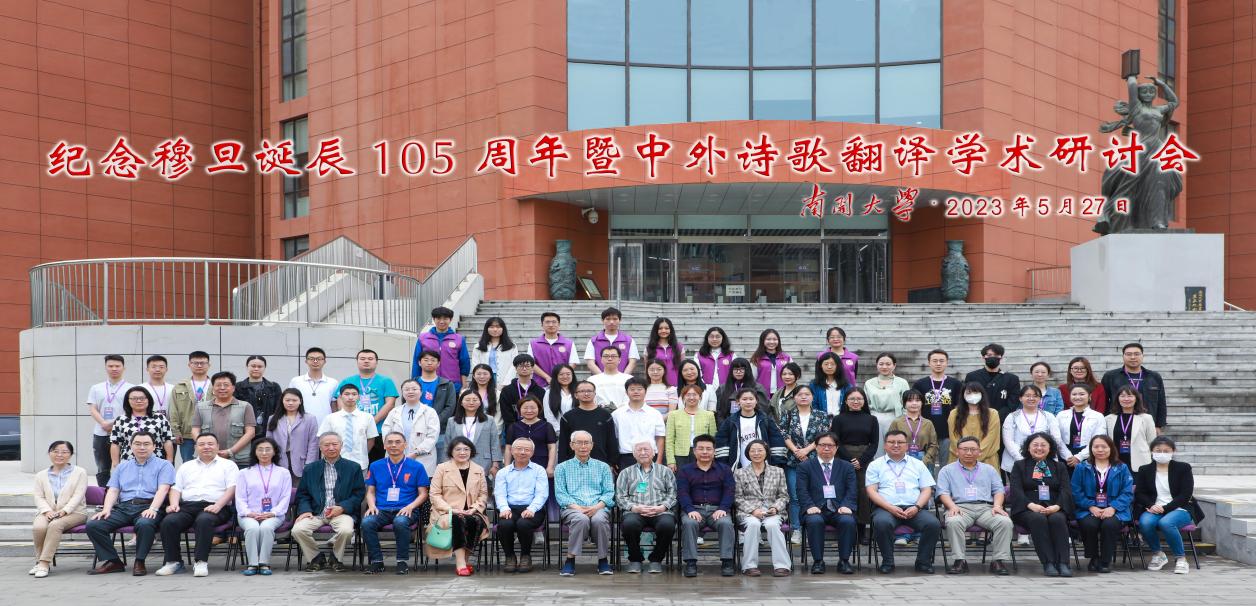From May 26 to 28, the College of Foreign Languages of Nankai University held the 105th anniversary of Mu Dan’s birth and an International Seminar of Poetry Translation. Experts, scholars, university teachers and students, and poetry lovers from all over the country gathered to commemorate Mu Dan — a modern patriot poet. They discussed academic topics related to Mu Dan, poetry translation and dissemination, translator studies, translation teaching, as well as other topics relevant to poetry and translation research.
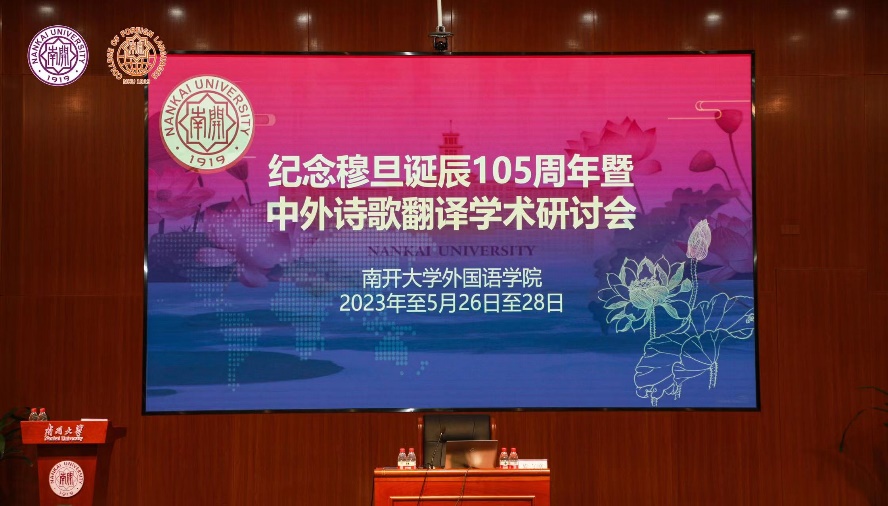
On the evening of May 26, the prelude of the seminar, "Poetry Recitation Night of Nankai", raised the curtain in the lecture hall of the College of Foreign Languages. The invited guests joined the poetry feast with teachers and students from the College. This activity was hosted by Zhao Man, a 2022 PhD student, and Zhou Yunfeng, a 2021 undergraduate student. The recitation covers ancient and modern themes at home and abroad, with diversified reading modes. It mingles the charm of poetry with that of translation and shows the attraction of multi-culture. On this night, friends meet each other by sharing ideas on poetry, preparing for the following two days of academic conference.
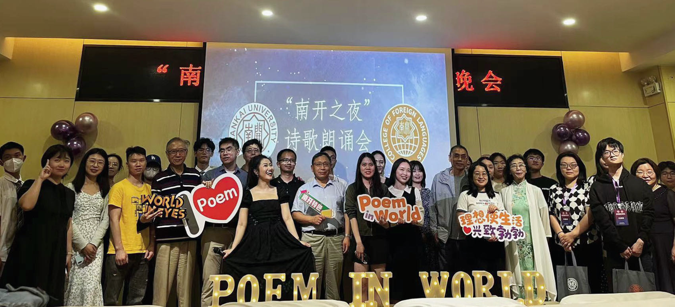
On the morning of May 27, the Seminarwas held in the lecture hall of Fan Sun Building. The opening ceremony was presided over by Professor Li Min,Vice Dean of the College of Foreign Languages. Mu Xiangwang, Dean of the Party Committee of the College of Foreign Languages, delivered a welcome speech. Professor Pan Wenguo, a tenured professor and doctoral supervisorof East China Normal University, Honorary President of the China Association for Comparative Studies of English and Chinese, made a keynote speech (read by Professor Hu Cui’e). Professor Luo Zhenya, Director of the Research Center for Mu Dan New Poetry of Nankai University, professor and doctoral supervisorof the School of Literature, gave another keynote speech.
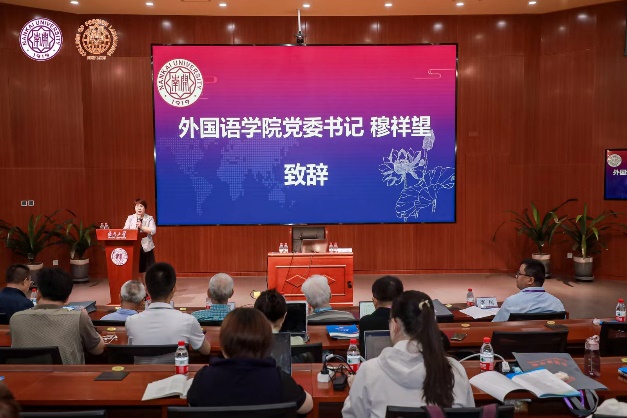
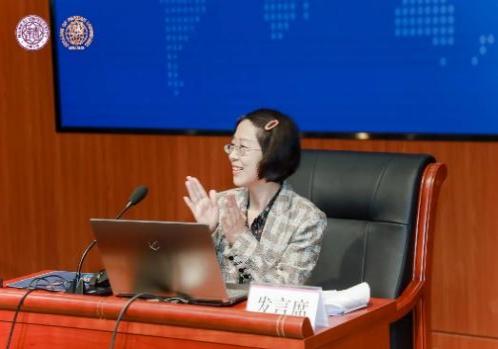
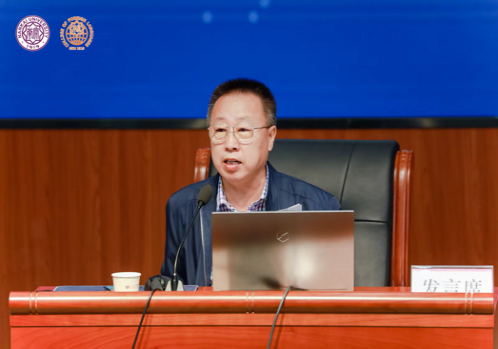
Using William Blake's "Tyger" as a prelude,Professor Pan Wenguo made a comparative analysis of several translations, in which he discussed the trilemma of poetry translation: the difficulty of grasping the original text, selecting expressions, and converting forms. His remarks are stemmed from translation practice and are combined with theory, thus being comprehensive and inspiring. Based on the enlightenment effect of Mu Dan's poems on the modern poetry circle, Professor Luo Zhenya proposed that Mu Dan's style of high-quality writing should be advocated and intellectual writing be strengthened. Meanwhile, he maintained that we should learn Mu Dan's emphasis on the transition of poetic elements and understand his ultra-utilitarian attitude towards life and composition. The research and exploration of these two experts were innovative, pioneering, and inspirational, which positively impacts poetry composition and translation.
At 9:50 a.m., Mu Xiangwang, Dean of the Party Committee of the College of Foreign Languages, announced the establishment of the Chinese Poetry Translation Center. Professor Zhang Zhizhong of the College of Foreign Languages of Nankai University was appointed as the director. At the same time, Mu Xiangwang issued appointment certifications for the experts.
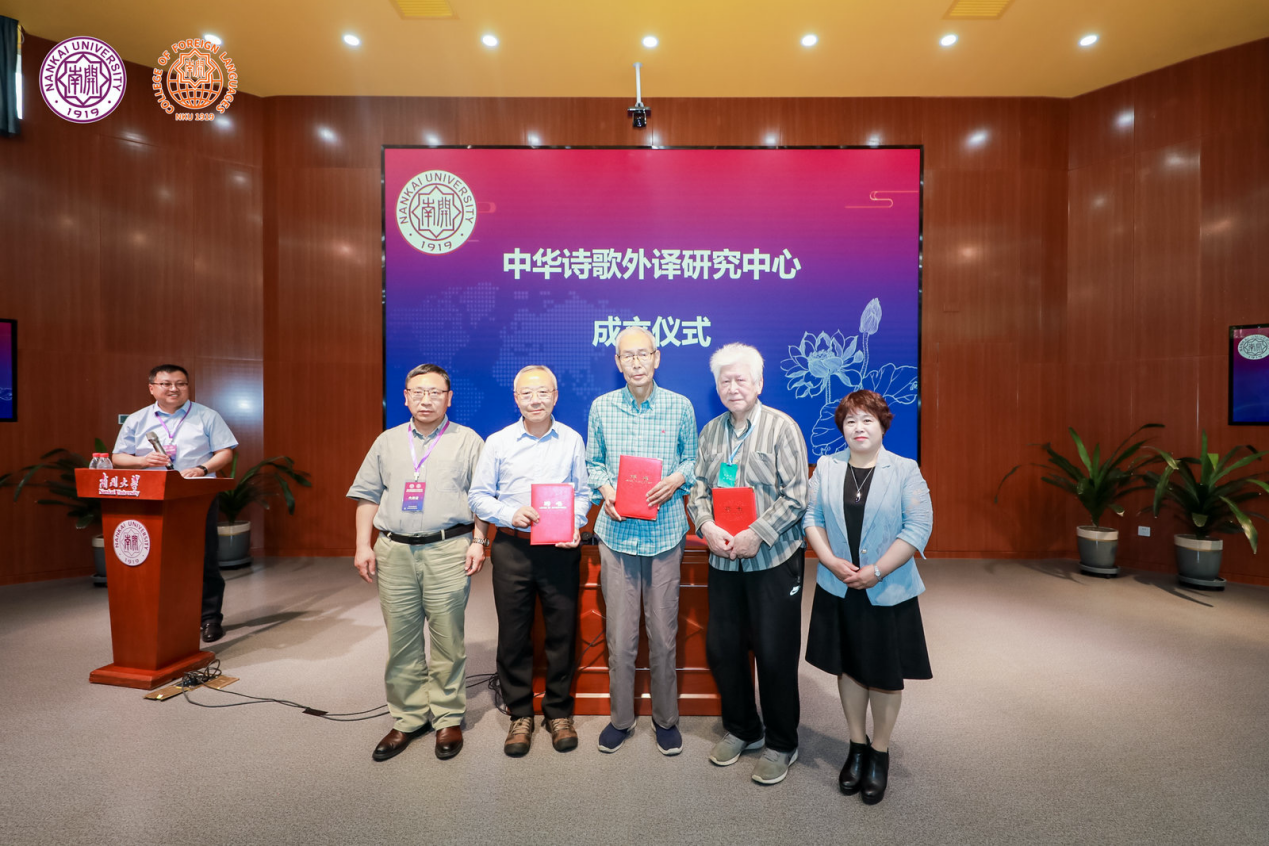
After the opening ceremony, Professor Zhang Zhizhong of the Chinese Poetry Translation Center gave a keynote speech entitled "Prose Style and Poetic Content: Contemporary Translation Theoriesonthe English Translation of Chinese Classical Poetry". He took his own translation practice as an example to illustrate his topic. Professor Liu Shicong delivered a speech on "Reading, Practicing, and Researching", emphasizing that rich experience in reading and practicing are the premise of conducting research. Good translators always have profound reading experience, as more practice can deepen our understanding of poetry.
Professor Gu Hengdong's (Gu Yu) report was on the theme of“Inspiration from Transplant of Bryusov's Verse Forms". He advocated Bryusov's idea of poetry translation ("Poetry translation should be line for line and verse for verse, preferably retaining all the artistic devices of the original and reproducing all the words as far as possible"). He then composed two poems to feature the theme of this seminar—the combination of academy and poetical sense.
On the afternoon of May 27, the sub-forums of the College were held respectively in Jiye Hall, Liangzheng Hall, Wuji Hall, Yuelan Hall, and Chen Kui Hall. The participants selected distinctive topics, demonstrating their broad interest and in-depth exploration of poetry translation and literary studies. Themes of the sub-forums covered multi-dimensional studies on Mu Dan's poetry, Eastern and Western poetics dialogues and poetry, overseas sinology and poetry translation, translators' theories and poetry translation, and cultural exchange and poetry translation. The attendees actively introduced their latest research outcomes, exchanged ideas, and discussed with each other.The sub-forum group leaders made in-depth summaries and comments. The members of each sub-forum delivered their opinionswithenthusiasm, creating a strong academic atmosphere.
On the morning of May 28, Gu Zhengkun, professor and doctoral supervisor of the PKU Institute of World Literature, delivered an online keynote speech entitled "Cultural Reflections on Mu Dan Phenomenon". He began with vivid and humorous examples, pointing out that the Mu Dan phenomenon is typical in China’s literary and art circles in the 20th century. It is an inevitable product of the conflict, conversion, and creation of three cultural trends. Combining China's practical needs for development, his speech probes into the enlightenment and lessons that the Mu Dan phenomenon gives to contemporary Chinese scholars.
Professor Fusheng Wu, a tenured professor of Chinese Literature and Comparative Literature at the University of Utah, made a speech entitled "A Discuss on Poetry Translation: Tradition of Using Flowers and Grass in Chinese and English Poetry". He argued that both Chinese and English poems usually adopt flowers and grass as metaphorical symbols for virtue. The pursuit of poetry translation is not scientific equivalence, but to reconstruct the same poetic effect and aesthetic experience.
Professor Liu Yuzhen, doctoral supervisor of the College of Foreign Languages andHead of Center for East Asian Cultural Studies, gave a speech on “Kundoku and Translation of SelectedPoems of the Tang Dynasty in Japan". He took the famous Chinese poem "A Tranquil Night" as an example to deeply discuss the version, kundoku, and translationof this poetry collection.
Professor Li Yuliang delivered a speech on "Coherence of‘Qi’ inthe English Translation of Chinese Poetry". Hemaintained that through the mental connection with the poet, the translatorinfuses the original poem’s beautiful "qi" (the unity of sensibility and rationality) into the translated version. Thus the "qi" embedded in the original poem and the translated one is connected, witha "qi" similar to the original poem being generated in the translated poem.
Based on the research of "Wang Hongyin's Thoughts on Poetry Translation", Associate Professor Wang Haili proposed that translators should work hard on language, style, and representation.She pointed out that Professor Wang Hongyin's studies on poetry translation offer guidance for translatingdomestic and foreign poems. They also provide practical and effective translation methodology, translation criticismprinciples, and translation practice guidelines for Chinese poetry "going out".
After each group’s reportsin the sub-forums, Professor Zhang Zhizhong made a summary and wrote an impromptu poem, pushing the meeting's atmosphere to the climax. During this seminar on poetry translation, experts and scholars expanded their horizons of poetry translation and literary research at multiple levels and in different directions. Theyshared new philosophies as well as methods of translation and jointly discussed innovative ideas and inspirations for future research and practice. All of them were full of enthusiasm to inherit and develop the cause of poetry translation.

